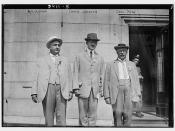No matter how bleak they seem, all plays end in hope. Discuss how true this statement is of a non-Shakespearean play you have studied.
What is hope? To place one's confidence in the belief that something better will be obtained. "The Crucible" by Arthur Miller is a play in which many innocent characters die. Although the main message of the play is the restoration of hope to the village of Salem in the 17th century, it leaves us with many questions of how much hope we should place in our own society.
The outcome of the play did not end in hope for many characters. As accusations permeated through the village, many innocent were falsely accused and condemned. Even the most 'godly' characters were killed such as Rebecca Nurse and Giles Corey. Reverend Hale lost his hope in the law of the Puritan society. At first he arrives in Salem projecting an air of knowledge and faith in the law.
"They must be; they are weighted with authority." "Theology sir is a fortress." As he observes the hangings on innocent people he loses his faith in the justice system and this causes him to turn against what he has believed in. "I denounce theses proceedings, I quit this court." The play has a bleak outcome, with the audience losing hope in human nature. It shows us that in difficult situations, good does not always prevail. Proctor's sons would've also lost faith in the justice system and the justice and morality of society as a result of human error and negligence. We can never fully place our hope in the justice of human society because it will eventually fail us.
The protagonist and perhaps the most significant character, John Proctor had the bleakest situation with little hope. His affair with Abigail...


